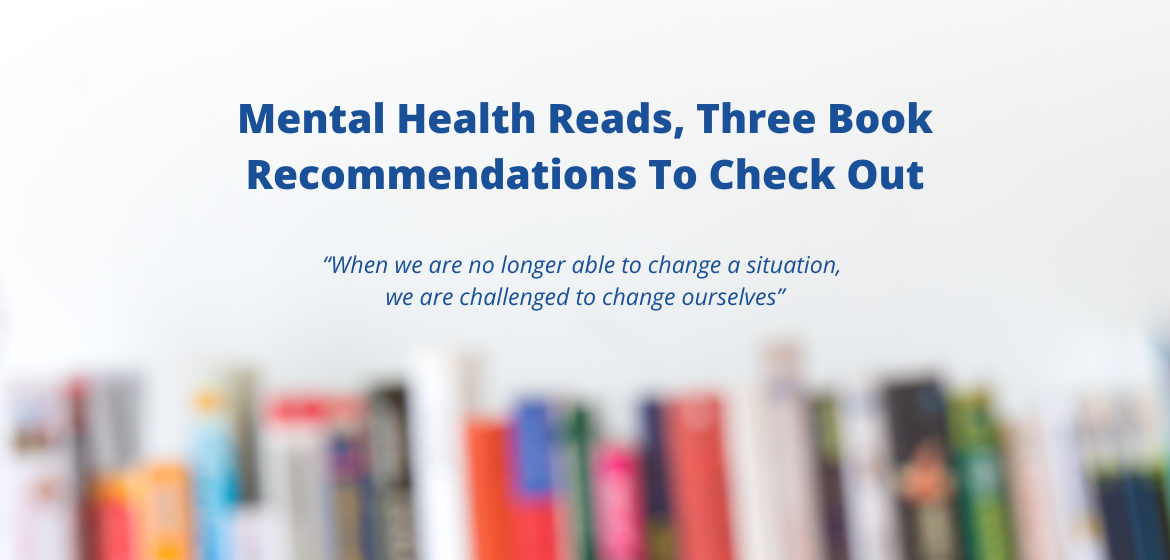
Mental Health Reads, Three Book Recommendations To Check Out
With it being World Book Day we thought we would ask some of the lecturers here at the college about the top mental health reads they would recommend.
“Man’s Search for Meaning” by Viktor Frankl
“The one thing you can’t take away from me is the way I choose to respond to what you do to me. The last of one’s freedoms is to choose one’s attitude in any given circumstance.”
This is a thought-provoking and insightful book that explores the human experience in the midst of extreme suffering. The book is divided into two parts, with the first part detailing Frankl’s experiences as a prisoner in Nazi concentration camps during World War II, and the second part discussing his approach to psychotherapy, known as logotherapy. While the book touches on a variety of themes, one of its primary focuses is mental health and the ways in which individuals can maintain a sense of purpose and meaning in their lives, even in the face of great adversity.
Throughout the book, Frankl emphasises the importance of finding meaning in life, even when circumstances are bleak. He argues that humans have an innate need for purpose, and that without a sense of meaning, individuals may struggle with feelings of emptiness, hopelessness, and despair. Frankl notes that this need for meaning is particularly pronounced during times of great suffering when individuals may feel that life has lost all meaning. In these moments, he suggests that individuals can find meaning in their suffering itself, by viewing it as an opportunity for growth and transformation.
Frankl’s approach to mental health is rooted in his experiences as a concentration camp prisoner. He notes that during his time in the camps, he observed that those who were able to maintain a sense of purpose and meaning were better able to withstand the physical and psychological demands of camp life. These individuals were able to find meaning in even the most mundane tasks, such as helping a fellow prisoner or simply surviving another day. Frankl argues that this ability to find meaning in the face of adversity is essential for mental health and well-being.
In the second part of the book, Frankl outlines his approach to psychotherapy, which he calls logotherapy. This approach is grounded in the belief that individuals can find meaning in their lives by discovering and pursuing their unique purpose or mission. Frankl argues that this sense of purpose is not something that can be prescribed or imposed by others but must be discovered through introspection and self-reflection. He notes that logotherapy can be particularly effective for individuals who are struggling with existential crises or feelings of meaninglessness, as it provides a framework for exploring these issues and finding a path forward.
 One of the most striking aspects of “Man’s Search for Meaning” is the way in which Frankl’s experiences in the concentration camps inform his approach to mental health. By drawing on his own experiences of suffering and survival, Frankl is able to offer a unique perspective on the importance of meaning and purpose in human life. His insights are both poignant and practical and offer a valuable resource for anyone who is struggling with mental health issues or seeking greater meaning and purpose in their lives.
One of the most striking aspects of “Man’s Search for Meaning” is the way in which Frankl’s experiences in the concentration camps inform his approach to mental health. By drawing on his own experiences of suffering and survival, Frankl is able to offer a unique perspective on the importance of meaning and purpose in human life. His insights are both poignant and practical and offer a valuable resource for anyone who is struggling with mental health issues or seeking greater meaning and purpose in their lives.
Eckhart Tolle’s “The Power of Now”
“The mind is a superb instrument if used rightly. Used wrongly, however, it becomes very destructive. To put it more accurately, it is not so much that you use your mind wrongly – you usually don’t use it at all. It uses you.”
One of the most famous books on the topic of mental health, it challenges readers to re-examine their relationship with time, the mind, and the present moment. Through his insightful teachings and practical advice, Tolle encourages readers to live in the present moment, rather than dwelling on the past or anxiously anticipating the future.
One of the central concepts of “The Power of Now” is the idea that the mind is a tool to be used when necessary, but not something that should control our lives. Tolle argues that the mind is constantly churning out thoughts, most of which are irrelevant or unimportant. He suggests that we should learn to observe these thoughts without getting caught up in them, so that we can achieve a state of inner peace and clarity. By doing so, we can access a deeper level of consciousness and experience a more meaningful and fulfilling life.
Another key idea in the book is the importance of being present in the moment. Tolle argues that the present moment is the only time that truly exists, and that by focusing on the present, we can escape the pain and suffering caused by dwelling on the past or worrying about the future. He suggests that we should learn to accept and embrace the present moment, even if it is unpleasant or uncomfortable. By doing so, we can develop a sense of gratitude and contentment that transcends our external circumstances.
The book is also filled with practical advice for those seeking to live in the present moment. Tolle offers techniques for quieting the mind, such as focusing on the breath or simply observing one’s thoughts without judgment. He also provides guidance on how to cultivate a sense of presence in everyday activities, such as walking, eating, or even washing the dishes. By integrating these practices into our daily lives, we can develop a greater sense of mindfulness and awareness, and ultimately experience a deeper sense of fulfilment and joy.
Tolle’s writing is clear and concise, and his insights are both profound and practical. By reading this book, readers will gain a deeper understanding of themselves and their place in the world, and will be inspired to make positive changes in their lives.
“The Myth of Normal” by Gabor Mate
“Whether we realize it or not, it is our woundedness, or how we cope with it, that dictates much of our behavior, shapes our social habits, and informs our ways of thinking about the world.”
Written by Gabor Mate, a renowned physician and bestselling author, this book discusses the concept of normality in our society and how it affects our mental health. The book highlights the fact that what is considered normal in our society may not always be healthy, and that many of our mental health problems arise from our inability to recognise and deal with this fact.
According to Mate, our society has a narrow and rigid definition of normality, which is based on arbitrary social and cultural standards. These standards are often reinforced by institutions such as schools, the media, and even the medical profession. This creates a culture where people who do not conform to these standards are labelled as abnormal or defective and may be ostracised or marginalised.
Mate argues that this narrow definition of normality is harmful to our mental health because it creates unrealistic expectations and puts pressure on individuals to conform to a certain way of being. This can lead to feelings of shame, guilt, and anxiety, as well as a sense of isolation and disconnection from others.
Furthermore, Mate explains that many of our mental health problems arise from our inability to meet these expectations and to deal with the resulting shame and guilt. For example, depression may be the result of a person’s inability to meet societal expectations of success, while anxiety may be the result of a person’s fear of being judged by others.
Mate suggests that one way to improve our mental health is to challenge the myth of normality and to recognise that there is no such thing as a “normal” person. Instead, he suggests that we embrace our differences and learn to appreciate the unique qualities that make each of us who we are.
Moreover, Mate encourages individuals to develop self-compassion and to be kinder to themselves. He suggests that individuals should learn to accept their own imperfections and to recognise that it is okay to make mistakes and to experience failure. This, in turn, can help to reduce feelings of shame and guilt and can lead to a greater sense of self-esteem and self-worth.
Another key takeaway from The Myth of Normal is the importance of understanding the role of trauma in mental health. Mate argues that many mental health problems are the result of early childhood trauma, such as abuse, neglect, or abandonment. He suggests that in order to heal from these traumas, individuals must first acknowledge and accept them, and then work to process them in a healthy way.
The Myth of Normal is a powerful book that challenges our society’s narrow definition of normality and encourages individuals to embrace their differences and to be kinder to themselves. By doing so, Mate suggests that we can improve our mental health and lead happier, more fulfilling lives.






















